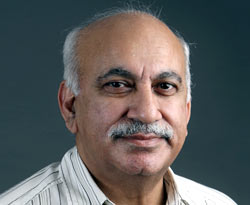New Delhi– India on Tuesday reiterated its commitment to help rebuild a “stable, inclusive and economically vibrant” Afghanistan and boost connectivity initiatives with the war-ravaged nation.
“India stands committed to any process which can help Afghanistan emerge as a united, peaceful, secure, stable, inclusive and economically vibrant nation, with guaranteed gender and human rights,” Minster of State for External Affairs M.J. Akbar said while addressing the “Tashkent Conference on Afghanistan: Peace Process, Security Cooperation and Regional Connectivity” in the Uzbekistan capital.

“We must all conform to internationally recognised red-lines,” Akbar said in the speech, a copy of which was released by the Ministry of External Affairs here.
“I also wish to reiterate India’s willingness and keenness to engage Afghanistan bilaterally and multilaterally, in cooperation with likeminded countries and international organisations.”
Referring to India’s role as a leading development aid partner of Afghanistan, Akbar said that New Delhi “has worked with principle and commitment to serve the Afghan people through capacity building, gender emancipation, human resource development, infrastructure development, connectivity, trade and investment” and its commitment for developmental assistance stands at $3 billion.
“Last year we embarked upon the New Development Partnership, which will support 116 ‘High Impact Community Development Projects’ in Afghanistan according to the priorities of the Afghan government. They include large scale projects such as drinking water for Kabul city and low-cost housing for returning Afghan refugees.”
Akbar said that India’s other key priority is helping Afghanistan in building “robust, reliable and year-round connectivity, improving trade and investment relations of Afghanistan with prominent markets in the region and beyond”.
“We strongly believe that lack of connectivity directly impacts the economic, security and political situation in Afghanistan.
“A well-connected Afghanistan can hope to become economically vibrant, prosperous and politically stable. It will be able to engage the energies of its youth, and attract back lost talent from an Afghan diaspora.”
In this connection, he referred to the Chabahar port in Iran that was inaugurated in December last year.
India, Iran and Afghanistan signed a trilateral agreement in 2016 to jointly develop the Chabahar port, opening a new strategic transit route between the three nations and other Central Asian nations, bypassing Pakistan.
“The Indian grant aid of 170,000 tonnes wheat supplies to Afghanistan is currently transiting through Chabahar,” Akbar said.
“The India-Afghanistan air freight corridor, established in June 2017, is another important achievement,” he said, adding that there are now cargo flights between Kabul, Kandahar, New Delhi and Mumbai.
“Thus far, over 110 flights have carried over 2,000 tonnes of exports from Afghanistan to India worth over tens of millions of dollars.”
At the same time, Akbar said that “terrorism and connectivity do not go together” in an obvious reference to Pakistan’s support to terrorism.
“Conflict born of extreme radicalism can be contagious, it is in our combined interest to eliminate it, so that Afghanistan and its neighbours can pursue the objectives of peace and prosperity for their people,” he said.
“Prosperity is impossible without peace and the greatest contemporary threat to peace is terrorism.”
Stressing “peace and reconciliation are difficult objectives in an atmosphere of terror and violence”, Akbar said: “We support strong action to pursue those who still choose the path of terrorism, aided by those who manipulate funds from an illicit narcotics trade to finance terror against innocent people.”
Uzbek President Shavkat Mirziyoyev organised the two-day Tashkent Conference on Afghanistan that started on Monday.
Iran, Russia and the US were among the countries that participated in the conference. (IANS)














